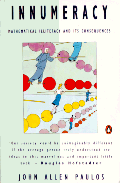
 |
Innumeracy |
Innumeracy-Chapter 2:Probability and Coincidence
It is no great wonder if ,in the long process of time,while fortune takes her course hither and thither,numerous coincidences should spontaneously occur.
-Plutarch
"You're a Capricorn ,too.That's so exciting."
4. Li'l Ol' Me and the Stars
Astrology is a particularly widespread pseudoscience.The shelves of
bookstores are stuffed with books on the subject,and almost every newspaper
publishes a daily horoscope.A 1986 Gallup poll reports that 52 percent of
American teenagers believe in it,and a distressing number of people in all
walks of life seem to accept at least some of it's ancient claims.I say
"distressing" because if people believe astrologers and astrology,it's
frightening to consider whom or what else they'll believe.It's especially
so when,like President Reagan,they have immense power to act on these
beliefs.
Astrology maintains that the gravitational attraction of the planets
at the time of one's birth somehow has an effect on one's personality.This
seems very difficult to swallow,for two reasons: (a) no physical or
neurophysiological mechanism through which this gravitational (or other sort
of ) attraction is supposed to act is ever even hinted at,much less explained;and
(b) the gravitational pull of the delivering obstetrician far outweighs
that of the planet or planets involved. Remember that the gravitational
force an object exerts on a body - say, a newborn baby - is proportional
to the object's mass but inversely proportional to to the square of the distance
of the object from the body - in this case the baby.Does this mean that fat
obstetricians deliver babies that have one set of personality characteristics,and
skinny ones deliver babies that have quite different characteristics?
These deficiencies of astrological theory are less visible to the
innumerate,who are not likely to concern themselves with mechanisms,and who
are seldom interested in comparing magnitudes.Even without
a comprehensible theoretical foundation,however,astrology would deserve respect
if it worked,if there were some empirical support for the accuracy of its
claims.But, alas,there is no correlation between the date of one's birth
and scores on any standard personality test.
Experiments have been performed (recently,by Shawn Carlson
at the University of California) in which astrologers have been given three
anonymous personality profiles,one of which was the client's.The client supplied
all the relevant astrological data about his life (via questionnaire,not
face-to-face) and the astrologer was required to pick the personality profile
of the client.There were 116 clients altogether,and they were presented to
the top (as judged by their peers) European and American astrologers.The
result:the astrologers picked the correct personality profile for the clients
about one out of three times,or no better than chance.
John McGervey,a physicist at Case Western Reserve University,looked
up the birth dates of more than 16,000 scientists listed in American Men
of Science and 6,000 politicians listed in Who's Who in American
Politics and found the distribution of their signs was random,the
signs uniformly distributed throughout the year.Bernard Silverman at
Michigan Sate University obtained the records of 3,000 married couples in
Michigan and found no correlation between their signs and astrologers'
predictions about compatible pairs of signs.
Why ,then,do so many people believe in astrology? One obvious reason
is that people read into the generally vague astrological pronouncements
almost anything they want to,and thus invest them with a truth which
is not inherent in the pronouncements themselves.They are also more likely
to remember true "predictions," overvalue coincidences,and ignore everything
else.Other reasons are its age ( of course,ritual murder and sacrifice
are as old),its simplicity in principle and comforting complexity
in practice,and its flattering insistence on the connection between the starry
vastness of the heavens and whether or not we'll fall in love this month.
One last reason,I would guess,is that during individual sessions
astrologers pick up clues about the clients' personalities from their facial
expressions, mannerisms, body language,etc.Consider the famous case of Clever
Hans,the horse who seemed to be able to count.His trainer would roll a die
and ask him what number appeared on the die's face.Hans would slowly paw
the ground the appropriate number of times and then stop,much to the amazement
of onlookers.What was not so noticeable,however,was that the trainer stood
stone-still until the horse pawed the correct number of times,and
then,consciously or not,stirred slightly,which caused Hans to stop.The horse
was not the source of the answer but merely a reflection of the trainer's
knowledge of the answer.People often unwittingly play the role of the
trainer to astrologers who,like Hans,reflect their clients' needs.
The best antidote to astrology in particular and to pseudoscience
in general is,as Carl Sagan has written,real science, whose wonders
are as amazing but have the added virtue of probably being real.After
all ,it's not the outlandishness of its conclusions that makes something
a pseudoscience:lucky guesses,serendipity,bizarre hypotheses,and even an
initial gullibility all play a role in science as well.Where pseudosciences
fail is in not subjecting their conclusions to a test,in not linking
them in a coherent way to other statements which have withstood
scrutiny.It's hard for me to imagine
Shirley Maclaine,for example,rejecting the reality
of some seemingly paranormal event such as trance channelling merely because
there isn't enough evidence for it,or because there is a better alternative
explanation.